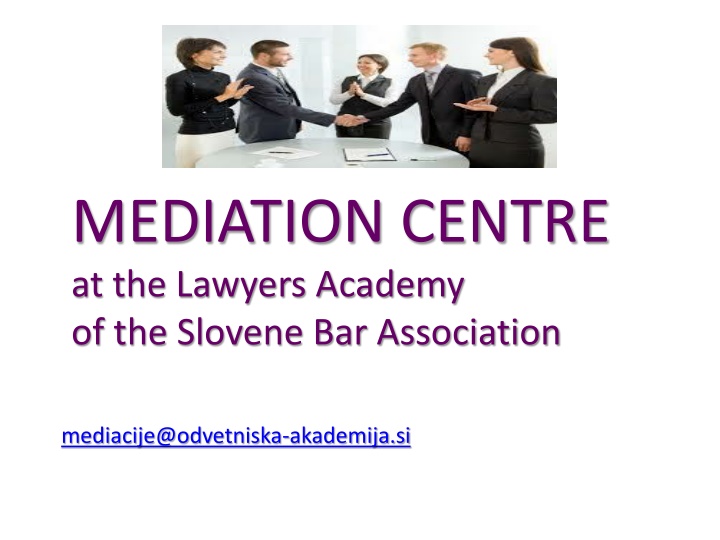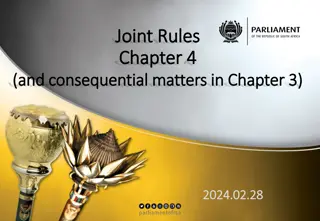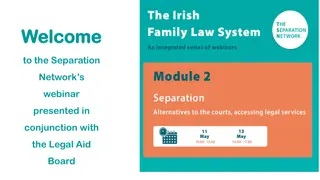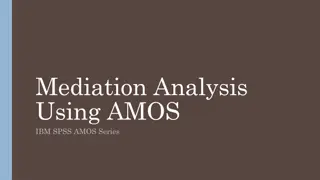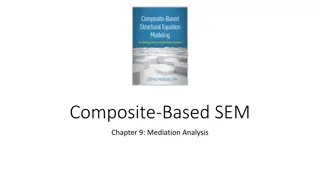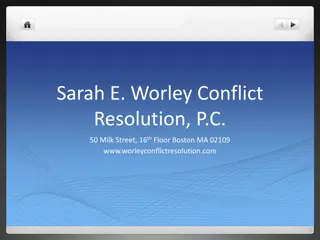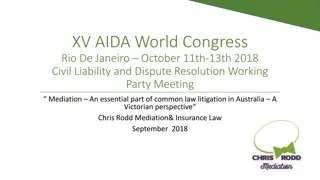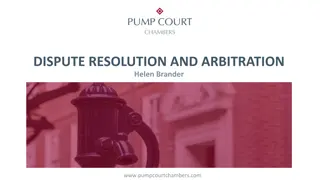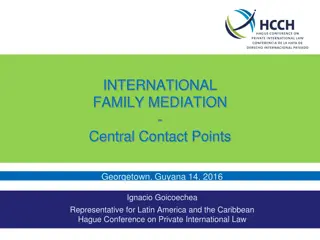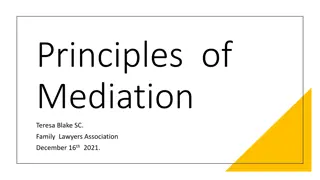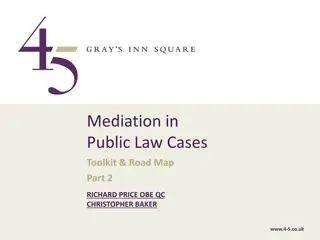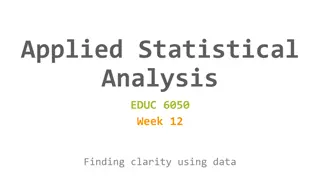Comprehensive Overview of Mediation Centre at the Lawyers Academy
The Mediation Centre at the Lawyers Academy of the Slovene Bar Association offers a detailed guide on mediation, including its process, significance, and appointment of mediators. It covers when mediation is possible, how to propose it, and the duties of mediators. The centre serves as an intermediary in various disputes, providing specialized mediation services before and during court proceedings. Mediation is applicable in civil, corporate, employment, and family-related disputes. Parties can mutually agree on a mediator from the centre's list, and mediation can be proposed by one of the parties or agreed upon in advance. This comprehensive resource aids in understanding the mediation process and its benefits.
Download Presentation

Please find below an Image/Link to download the presentation.
The content on the website is provided AS IS for your information and personal use only. It may not be sold, licensed, or shared on other websites without obtaining consent from the author.If you encounter any issues during the download, it is possible that the publisher has removed the file from their server.
You are allowed to download the files provided on this website for personal or commercial use, subject to the condition that they are used lawfully. All files are the property of their respective owners.
The content on the website is provided AS IS for your information and personal use only. It may not be sold, licensed, or shared on other websites without obtaining consent from the author.
E N D
Presentation Transcript
MEDIATION CENTRE at the Lawyers Academy of the Slovene Bar Association mediacije@odvetniska-akademija.si
Content: Plan and vision of the Centre When is mediation possible? How to propose mediation? Start and completion of mediation Appointing mediators (case assignment) Duties of mediators in mediation Mediation tariff and mediators fees Effect of mediation on limitation periods Conditions for inclusion on the List of mediators Administrative costs of the Mediation Centre Challenges
Plan and vision of the Centre intermediary between parties at dispute provider of mediation in disputes before and during court proceedings specialisation as lawyer-mediator? the largest out-of-court private Mediation Centre organised by an institution recognition of the Mediation Centre by the general public
When is mediation possible? in all disputes involving civil, corporate, employment, family relationships involving claims with which parties are free to act as they please in other disputes when mediation fits the nature of the relationship unless expressly excluded by the law before or after submitting a claim in a court and property
Who can propose mediation? Answer: Mediation is possible, if parties agree to it. When mediation is proposed: upon a proposal of one of the parties, the Mediation Centre may offer mediation to one or both parties. In such a case, the Mediation Centre tries to obtain a consent from the other party and even from both parties. upon a prior agreement between the parties that any disputes arising from a particular legal relationship are to be resolved by mediation or by mediation at the Mediation Centre. This of course is not a pre-condition for starting the procedure according to the Rules of the Mediation Centre.
Appointing a mediator Parties mutually agree on a mediator from the Mediation Centre s List of mediators by: 1. agreeing to use one of the mediators; 2. the party having submitted a proposal for mediation, proposes two or three mediators and the other party who has accepted the mediation, selects a mediator from the list of two or three proposed; 3. if selecting a mediator cannot be mutually agreed on, the mediator is selected by the Head of the Mediation Centre from the Mediation Centre s List of mediators, in the order of priority; exceptionally, a mediator is selected by personal assessment in light of specific elements of the case. Exceptionally, when proposed by parties or proposed by the head of the Mediation Centre and agreed by parties, a mediator can also be a person who is not on the Mediation Centre s List of mediators.
Co-mediator With consent of parties, a mediator may manage mediation together with a co-mediator A Co-mediator may be recommended by a mediator, parties or the Head of the Mediation Centre. When proposed by the parties or by the Head of the Mediation Centre, a co-mediator can also be a person who is not on the Mediation Centre s List of mediators. When parties of mediation agree on a co-mediator s participation in mediation, the fee for the co-mediator s work is assessed as laid down in the Special Part of the Tariff, reduced by 30%.
Duties of mediator in mediation 1. A mediator, to whom a case was assigned, must inform the Mediation Centre within 3 days when there is a conflict of interests, due to which he or she cannot accept the case. 2. Act fast and on time; Once a mediator was informed a case was assigned to him or her, the mediator must set the first meeting within 15 days after receiving the notice. The mediator arranges meetings directly with the parties and sends them notices (e-mail). The Mediation process can last 90 days at most; it can be extended with parties written consent. The mediator informs the Head of the Mediation Centre when the processes is extended. 3. A mediator informs the Mediation Centre once mediation is completed and how the case was resolved A mediator issues invoice for his or her services and covers administrative costs for the work of the Mediation Centre once mediation is completed. Accept mediation or notify of conflict of interests;
Start and completion of mediation The party proposing mediation informs the Mediation Centre by email of its proposal; at the same time, communicates contact details of the other party and briefly explains the dispute. The Mediation Centre sends the other party a consent form for mediation to be signed and if the other party gives the consent within 15 days, the first mediation meeting is scheduled within 15 days thereafter. The communication is mostly by email. What is the result of mediation? concluding an agreement, issuing a statement on unsuccessful mediation or withdrawing the consent; if parties reach an agreement, the agreement is drawn up in a form of an out-of-court settlement, a directly enforceable notarial deed or as a court settlement. When signing court settlements we will work with the Court in Ljubljana that has jurisdiction in such cases.
Signing court settlement under Article 309 of the Civil Procedure Act (preventive settlement) participation of local courts; currently there is an agreement with the Court in Ljubljana without hearing; settlement within 7 days payment of court fee; a settlement must have the following elements: listing of the dispute agreement on jurisdiction agreement on distribution of costs of the procedure payment of court tax; bank account
Effect of mediation on limitation periods (Article 17 of the ZMCGZ) The limitation period for filling a claim in case of undergoing mediation is interrupted. If the mediation does not result in an agreement, the limitation period commences once the mediation process is finished, without having reached an agreement. The time passed prior to the start of mediation is included in the calculation of the limitation period laid down by the law. If special rules prescribe a different deadline for submitting a claim, this deadline does not expire before 15 days after completing mediation concerning the claim that was the subject of mediation.
Fees for mediators Basic principle for service fees: Fees for mediators work consists of a lump sum payment and a reward for successful resolution and for drawing-up an agreement. Any additional hours are calculated separately according to separate tariff. Parties also cover mediator s travelling expenses. Parties distribute fees for mediator s work equally among themselves unless expressly agreed otherwise. Parties pay fees for mediator s work in accordance with the Mediator Tariff and his or her travelling costs directly to the mediator according to the invoice issued by the mediator.
Mediation Tariff Tariff number 1 Fees for mediator s work in case of a dispute involving natural persons or where at least one of the parties is an independent entrepreneur Parties pay a lump sum of EUR 400 for the whole mediation. The lump sum amount includes 6 mediation hours. Every additional started mediation hour is calculated at EUR 50 per hour. If mediation is successfully resolved, a reward for success and for drawing up an agreement is charged at EUR 200. Tariff number 2 Fees for mediator s work in case of a dispute involving legal entities (copmanies, etc excluding independent entrepreneurs) Parties pay a lump sum of EUR 600 for mediation. The lump sum amount includes 6 mediation hours. Every additional started mediation hour is calculated at EUR 80 per hour. If mediation is successfully resolved, a reward for success and for drawing up an agreement is charged at EUR 300.
Mediation Tariff - increase Fees for mediator (lump sum and reward under Tariff number 1 or 2) is increased: in disputes involving more parties where there are more than two parties, fees are increased by 20% for each additional party that has an independent claim. where the value of dispute is known and exceeds EUR 50,000 fees are increased by 100%. in particularly difficult cases upon a proposal of the Head of the Mediation Service and with consent of parties, fees can be increased for 50%. where knowledge of specific and difficult area is required where knowledge and use of foreign language is required where one or more other independent court cases are resolved in addition to the case assigned to a mediator for resolution, fees are increased for 50% for resolving an additional associated case
Where will mediation meetings take place? Mediation generally takes place at the seat of the Mediation Centre; it can also take place in other appropriate offices with a consent of the Head of the Mediation Centre Agreement mediation outside Ljubljana on mediation preforming the Exceptionally in law firms!
Inclusion on the List of mediators Any lawyer complying with the following conditions can be included on the List: is registerred in the Register of Lawyers or Lawyer Candidates of the Slovene Bar Association; has full mental capacity; had not been convicted by a final judgment for intentionally committing a criminal offence prosecutable by public prosecution; has completed at least 44 hour training for mediators at the Slovene Bar Association, the District Court in Ljubljana, the Ministry of Justice or another training providers approved by the Academy s expert council; has completed at least two independent mediation or at least two mediation observations process at the Mediation Centre or before a court; has completed annually at least 12 hours of additional training for mediators at training providers approved by the Academy s expert council; Inclusion in the List takes place twice per year.
Information on the List of mediators The published List of mediators includes the following information: personal name of mediator; professional or academic title; Employment; date of inclusion on the List; short r sum (no more than 1 page of A4); photo (optional);
Important for mediators agreement on mediation; defining the tariff; keeping records of the meetings; drawing up a draft of the court settlement, in accordance with the law (Article 309) and the requirements of a local court; sending information and keeping records for statistics;
Administrative costs of the Mediation Centre From each mediation assigned to a mediator through the Mediation Centre, a mediator covers administrative costs for the work of the Mediation Centre, payable as 10% lump sum in the Special Part of the Tariff. Depending on the number of mediations assigned to a mediator, the Mediation Centre issues an invoice once per month. When cases assigned to a mediator do not result in the first meeting or mediation does not take place for reasons other that the mediator s action, the mediator does not have to pay the lump sum fee to the Mediation Centre.
Challenges Assignment of cases; Ensuring quality; Adjusting to rules (work in progress); Recognition and promotion; Offices, websites; Providing administrative support;
THANK YOU FOR YOUR ATTENTION! Mediation Center at the Lawyers Academy of the Slovenian Bar Association
